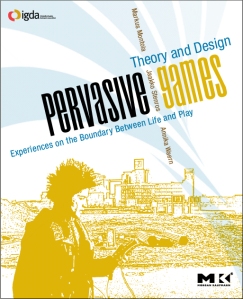If you intend to teach a course on pervasive gaming, based on Pervasive Games: Theory and Design, or want to learn more after reading it, this list of supplementary reading may direct you to interesting texts in the various key areas, even though we recommend against making your students read the whole stack. This is a living document, so please voice your disagreement!
In a vague order of relevance in each section.
Game Research Context
Huizinga, Johan (1955): Homo Ludens. A Study of Play Element in Culture. Beacon Press. Also in Salen, Katie & Zimmerman, Eric (eds.) (2006): Game Design Reader. MIT Press. First chapter.
Salen, Katie & Zimmerman, Eric (2004): Rules of Play. MIT Press. Chapter 33: Games as Cultural Environment.
Goffman, Erving (1973): Frame Analysis. An Essay on the Organization of Experience. Northeastern. Chapters Three (Keys and Keying) and Four (Designs and Fabrication).
Alternate Reality Games
McGonigal, Jane (2003a): ‘This Is Not a Game’: Immersive Aesthetics & Collective Play. In Digital Arts & Culture 2003 Conference Proceedings. DAC 2003. Melbourne, Australia.
McGonigal, Jane (2003b): A Real Little Game: The Performance of Belief in Pervasive Play. In Copier, Marinka & Raessens, Joost (eds.) Level up. Digital Games Research Conference 4-6 November 2003 Proceedings. DiGRA 2003. Universiteit Utrecht, Utrecht.
Dena, Christy (2008): Emerging Participatory Culture Practices: Player-Created Tiers in Alternate Reality Games. In Convergence: The International Journal of Research into New Media Technologies, Vol. 14, No. 1, 41-57. Sage.
Örnebring, H. (2007): Alternate reality gaming and convergence culture. The case of Alias. In International Journal of Culture Studies, Vol. 10, No. 4, 445-462. Sage.
Location-Based Games
Licoppe, C. & Inada, Y. (2008): Geolocalized Technologies, Location-Aware Communities, and Personal Territories: The Mogi Case. In Journal of Urban Technology, Volume 15, Issue 3 December 2008.
Reid, J. (2008): Design for coincidence: incorporating real-world artifacts in location-based games. In Proceedings of ACM International Conference on Digital Interactive Media in Entertainment and Arts. DIMEA 2008, Athens, Greece.
Sotamaa, Olli (2002): All the World’s a BotFighters Stage: Notes on Location-based Multi-User Gaming. In Mäyrä, F. (ed.): Computer Games and Digital Cultures Conference Proceedings. Tampere University Press, Tampere.
Pervasive Game Technology
[tbd]
Society and Arts
Boal, Augusto (2002): Games for Actors and Non-Actors. Second Edition. Routledge. Relevant parts.
Flanagan, Mary (2007): Locating Play and Politics: Real World Games & Activities. In Digital arts and culture 2007 proceedings .
Jenkins, Henry (2006): Convergence Culture. New York University Press. Chapter 1 Spoiling Survivor: The Anatomy of a Knowledge Community.
Banksy (2001): Banging your head against a brick wall. Aeroholics. Relevant parts.
Debord, Guy (1955): Introduction to a critique of urban geography. Originally published in Les L èvres Nues #6. September 1955.
Further Case Studies
von Borries, F., Walz, S.P. & Böttger, M. (eds.) (2007): Space Time Play. Computer Games, Architecture and Urbanism: The Next Level. Birkhäuser, Berlin.
Caddell, B. (2009): Becoming a Mad Man.


[…] Course Reader […]
By: Pervasive Games Course Reader « Pervasive Games: Theory and Design on November 30, 2009
at 13:27
Broken link:
McGonigal, Jane (2003a): ‘This Is Not a Game’: Immersive Aesthetics & Collective Play. In Digital Arts & Culture 2003 Conference Proceedings. DAC 2003. Melbourne, Australia.
By: Jakob la Cour on November 30, 2009
at 15:23
[…] This post was mentioned on Twitter by Bud Caddell, Ryan Chapman. Ryan Chapman said: RT @bud_caddell like game theory? like reading lists? my god, this is perfect for you then. http://bit.ly/6PT8kz (I'm reading Jenkins now!) […]
By: Tweets that mention Course Reader « Pervasive Games: Theory and Design -- Topsy.com on November 30, 2009
at 15:55
[…] — good news: We put a Course Reader page up, where you can find recommendations on further reading. It’s a living document (and the […]
By: Planner Reads » Blog Archive » Pervasive Games Course Reader on November 30, 2009
at 16:45
[…] — good news: We put a Course Reader page up, where you can find recommendations on further reading. It’s a living document (and the […]
By: Pervasive Games Course Reader / what consumes me, bud caddell on November 30, 2009
at 17:23
Thanks Jakob, the link works now!
By: Stenros on November 30, 2009
at 18:12
[…] Course Reader […]
By: Year in Review « Pervasive Games: Theory and Design on June 7, 2010
at 11:45